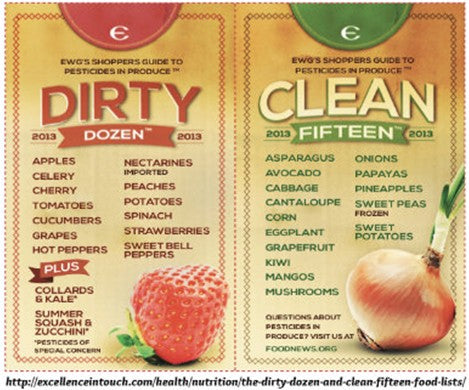For many, the urge to “go organic” is quashed by the idea that making environmentally conscious choices are too expensive, inconvenient, and just not worth the trouble. The good news is, if you're looking for simple ways to go organic, you can choose organic versions of just a few foods that you eat often to increase the percentage of organic food in your diet without big changes to your shopping cart or your spending.
If you think strategically about the changes you’d like to make in your family’s diet, choosing organic produce for example, will likely not strain your food budget.
The Dirty Dozen™
Perhaps the simplest way to get started is by studying the lists of produce that are safest, and not safe: The Dirty Dozen™ and the Clean Fifteen™:

Developed by the Environmental Working Group (EWG), the Dirty Dozen is a shopping guide of fruits and vegetables to avoid due to the relatively high levels of pesticides used to grow them, and which tend to remain even after they’ve been brought to market.
EWG singles out produce with the highest pesticide loads for its Dirty Dozen™ list. This year, includes strawberries, apples, nectarines, peaches, celery, grapes, cherries, spinach, tomatoes, sweet bell peppers, cherry tomatoes, and cucumbers.
Each of these foods tested positive for a number of different pesticide residues and showed higher concentrations of pesticides than other produce.
Key findings from EWG for 2016:
- More than 98% of strawberry samples, peaches, nectarines, and apples tested positive for at least one pesticide residue.
- The average potato had more pesticides by weight than any other produce.
- A single grape sample and a sweet bell pepper sample contained 15 pesticides.
- Single samples of strawberries showed 17 different pesticides.
The Clean Fifteen™
By comparison, EWG's Clean Fifteen™ is a list of produce least likely to hold pesticide residues, and includes: avocados, sweet corn, pineapples, cabbage, frozen sweet peas, onions, asparagus, mangoes, papayas, kiwis, eggplant, honeydew melon, grapefruit, cantaloupe, and cauliflower. Relatively few pesticides were detected on these foods, and tests found low total concentrations of pesticides on them.
With critical information like this at your disposal, making the choice to go organic becomes far easier, with little effect on your food budget. And, while doing so may not “save the world”, it’s a good way to begin, and will certainly ensure healthier eating for you and your family.
Want to be kept “in the loop” when new organic clothing designs for women, toddlers, and babies are available? Click here to sign up for the Simply Chickie Newsletter.
Are you thinking of opening your own online store? The Shopify Platform is a great way to get it done. Click here for more: Shopify.